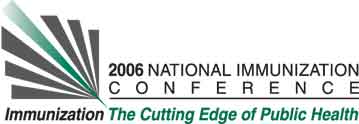James B. Bender, Center for Health Communication, Academy for Educational Development, 1825 Connecticut Ave, NW, Washington, DC, USA and Laura Ann Nicolai, Division of Immunization, Virginia Department of Health, 109 Governor Street, Richmond, VA, USA.
Learning Objectives for this Presentation:
By the end of this presentation, participants will be able to:
Demonstrate an understanding of why states need a comprehensive plan in place before the onset of an influenza pandemic;
Name 3 major challenges that must be dealt with in order to develop a useful pandemic plan;
Name 3 ways traditional immunization programs can be involved in pandemic influenza planning.
Background:
The world experienced 3 influenza pandemics in the 20th century resulting in 2 to 10 times excess mortality compared with the seasonal influenza epidemic. Moreover, a severe pandemic can cause significant economic, public safety, or political disruption.
Setting:
The CDC requested all 50 state health departments develop pandemic influenza plans. Effective pandemic management will require the harmonizing efforts of diverse federal, state and local government agencies as well as private sector groups including healthcare, employers, and the pharmaceutical industry.
Population:
The pandemic planning process is often led by the state epidemiologist and emergency preparedness departments. Traditional immunization programs and immunization coalitions have connections and technical expertise that can help pandemic planners develop harmonious cross-sector relationships and extensive support for difficult priority decisions.
Project Description:
Substantial public health and policy questions must be answered to develop a comprehensive and effective pandemic influenza plan. These challenges include decisions about vaccine and antiviral delivery and prioritization; management of the expected surge in demand for healthcare services and containment of the virus in the community while maintaining operation of critical public services.
Results/Lessons Learned:
The only way our society can respond effectively to the next pandemic is to make difficult policy decisions in advance of the outbreak. Multiple government and private sector groups must be willing to commit significant effort to this planning process in order to mitigate the effects of the next pandemic. Traditional immunization staff and coalitions should contribute their expertise and connections to that planning process.
See more of Posters
See more of The 40th National Immunization Conference (NIC)

